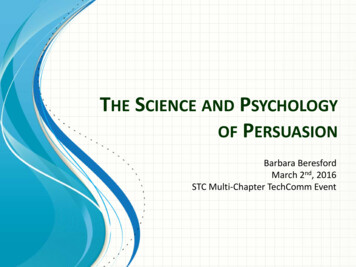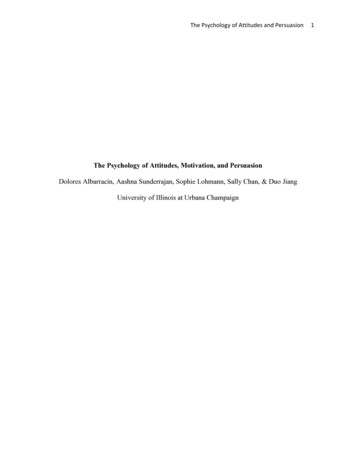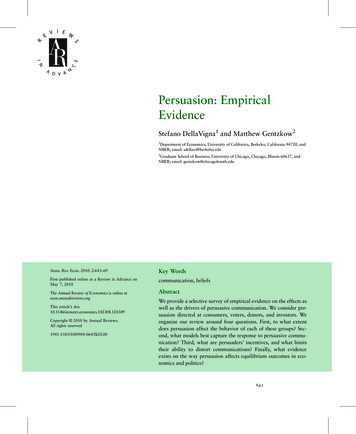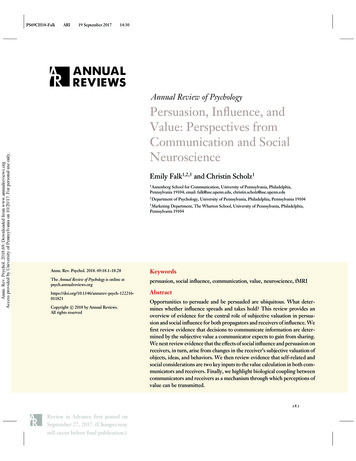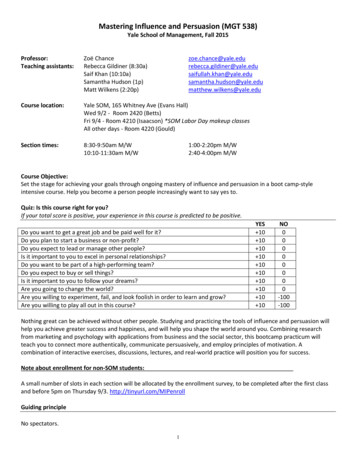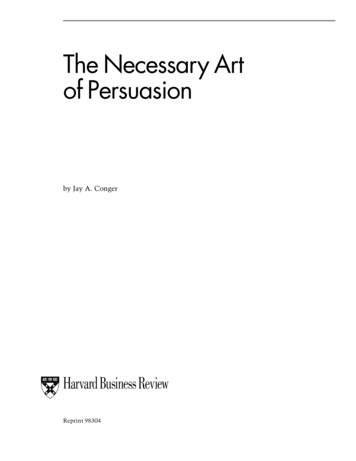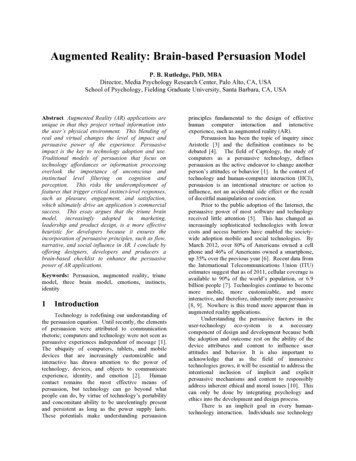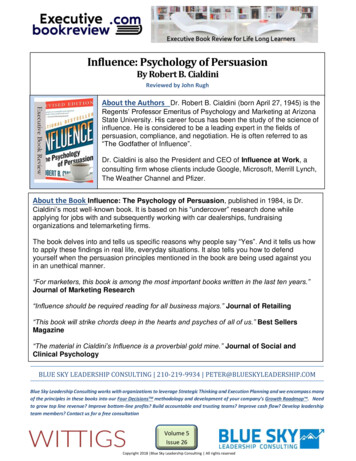
Transcription
Influence: Psychology of PersuasionBy Robert B. CialdiniReviewed by John RughAbout the Authors Dr. Robert B. Cialdini (born April 27, 1945) is theRegents’ Professor Emeritus of Psychology and Marketing at ArizonaState University. His career focus has been the study of the science ofinfluence. He is considered to be a leading expert in the fields ofpersuasion, compliance, and negotiation. He is often referred to as“The Godfather of Influence”.Dr. Cialdini is also the President and CEO of Influence at Work, aconsulting firm whose clients include Google, Microsoft, Merrill Lynch,The Weather Channel and Pfizer.About the Book Influence: The Psychology of Persuasion, published in 1984, is Dr.Cialdini’s most well-known book. It is based on his “undercover” research done whileapplying for jobs with and subsequently working with car dealerships, fundraisingorganizations and telemarketing firms.The book delves into and tells us specific reasons why people say “Yes”. And it tells us howto apply these findings in real life, everyday situations. It also tells you how to defendyourself when the persuasion principles mentioned in the book are being used against youin an unethical manner.“For marketers, this book is among the most important books written in the last ten years.”Journal of Marketing Research“Influence should be required reading for all business majors.” Journal of Retailing“This book will strike chords deep in the hearts and psyches of all of us.” Best SellersMagazine“The material in Cialdini’s Influence is a proverbial gold mine.” Journal of Social andClinical PsychologyBLUE SKY LEADERSHIP CONSULTING 210-219-9934 PETER@BLUESKYLEADERSHIP.COMBlue Sky Leadership Consulting works with organizations to leverage Strategic Thinking and Execution Planning and we encompass manyof the principles in these books into our Four DecisionsTM methodology and development of your company’s Growth Roadmap . Needto grow top line revenue? Improve bottom-line profits? Build accountable and trusting teams? Improve cash flow? Develop leadershipteam members? Contact us for a free consultationVolume 5Issue 26Copyright 2018 Blue Sky Leadership Consulting All rights reserved
Influence and persuasion.What do you think of when you hear these words? You might think they are important skills forsales people, politicians, hostage negotiators, and football coaches. And you would be right.But what about the rest of us? The ability to persuade and influence matters to us as well. Thinkabout it: whether you are a student, a spouse, a parent, a friend, an employee, an employer, or asolo entrepreneur, you need to be able to get other people to see your point of view and to say“Yes”. Don’t you agree?As a result of his research, Dr. Cialdini concluded that influence is based on six key principles:reciprocity, commitment and consistency, social proof, authority, liking, and scarcity. We willexamine each of these today.Each of the six principles in this book have been shown to help people like us become moreinfluential and persuasive. Implement these principles properly and you stand to benefit in a bigway.A WarningHere is something to keep in mind though. These principles are powerful. And they can beharnessed for profound good or exploited for unspeakable evil. Please, for your sake, that of thepeople you encounter, and the world at large, use them morally and ethically.So let’s dive into each of these principles. As we do, be thinking about how they might apply toyou and your life and how you can harness their power for greater success.“I can admit it freely now. All my life I’ve been a patsy. For as long as I can recall, I’ve been aneasy mark for the pitches of peddlers, fund-raisers, and operators of one sort or another. True,only some of these people had dishonorable motives. The others – representatives of certaincharitable agencies, for instance – have had the best of intentions. No matter.With personally disquieting frequency, I have always found myself in possession of unwantedmagazine subscriptions or tickets to the sanitation workers’ ball. Probably this long-standingstatus as sucker accounts for my interest in the study of compliance: Just what are the factorsthat cause one person to say yes to another person? And which techniques most effectively usethese factors to bring about such compliance? I wondered why it is that a request stated in acertain way will be rejected, while a request that asks for the same favor in a slightly differentfashion will be successful”. Robert Cialdini, from the book’s introduction.Book Review: Influence: Psychology of PersuasionPage 2 7Volume 5Issue 26
Six Weapons of Automatic Influence1. Reciprocation“Pay every debt, as if God wrote the bill.” Ralph Waldo EmersonCialdini tells the story of an experiment conducted by a university professor. He sent Christmascards to a sampling of complete strangers. He received an overwhelming response. Christmascards addressed to him came pouring back from many of the recipients, people who had nevermet or even heard of him.Pg. 17: “The great majority of those who returned a card never inquired into the identity of theunknown professor. They received his holiday greeting card, click, and whirr, they automaticallysent one in return.”Pg. 17: “While small in scope, this study nicely shows the action of one of the most potent of theweapons of influence around us – the rule for reciprocation. This rule says that we should try torepay, in kind, what another person has provided us”.Now think about this. When someone does something for us, don’t we feel an obligation toreciprocate? Yes! This is a deep, visceral response. Click! Whirr! We want to return the favor!2. Commitment and Consistency“It is easier to resist at the beginning than at the end.” – Leonardo Da VinciWe want our words and actions to be in alignment. We deeply desire, on some level, to be, andbe seen as, people who are consistently committed to something good. We want to be seen asreliable. In many, perhaps even most, situations in our lives, commitment and consistency aregood and useful.Pg. 57: “But because it is so typically in our best interest to be consistent, we easily fall into thehabit of being automatically so, even in situations where it is not the sensible way to be.”Pg. 57: “Like other weapons, this one lies deep within us, directing our actions with quiet power.It is, quite simply, our nearly obsessive desire to be (and to appear) consistent with what wehave already done. Once we have made a choice or taken a stand, we will encounter personaland interpersonal pressures to behave consistently with that commitment. Those pressures willcause us to respond in ways that justify our earlier decision.”Book Review: Influence: Psychology of PersuasionPage 3 7Volume 5Issue 26
Pg. 58: “Psychologists have long understood the power of the consistency principle to directhuman action .The drive to be (and look) consistent constitutes a highly potent weapon ofsocial influence, often causing us to act in ways that are clearly contrary to our own selfinterests.”3. Social Proof“When all think alike, no one thinks very much.” – Walter LippmannLet’s be honest, even if we like to fancy ourselves as leaders, even if we are leaders, on somelevel we are all followers. In many cases, what we like (and the degree to which we like it) isinfluenced by the likes and dislikes of other people.Pg. 115: “Experiments have found that the use of canned merriment causes an audience tolaugh longer and more often when humorous material is presented and to rate the material asfunnier.”Would you find your favorite TV sitcom as funny as you do if it did not have pre-recordedlaughter? Highly doubtful. Our enjoyment of the program is enhanced by the enjoyment of otherslaughing at it, even if those others are part of a canned laugh track.This is just one example of the pervasiveness of social proof.The influence of social proof goes far beyond the entertainment world. You can harness itspower in your business or career. How? Here’s one small way: Collect testimonials fromsatisfied clients. Display them on your website and other marketing materials. In addition to youselling you, let them – your happy clients, sell you.4. Liking“The main work of a trial attorney is to make a jury like his client.” – Clarence DarrowThink about this common business cliché: “People do business with those they know, like andtrust”. The Seinfeld “Soup Nazi” episode notwithstanding, we want to do business with peoplewe like. So, it pays to be likeable.Pg. 167: “Few people would be surprised to learn that, as a rule, we most prefer to say yes tothe requests of someone we know and like. What might be startling to note, however, is that thissimple rule is used in hundreds of ways by total strangers to get us to comply with their requests.The clearest illustration I know of the professional exploitation of the liking rule is theTupperware party, which I consider the quintessential American compliance setting.”Book Review: Influence: Psychology of PersuasionPage 4 7Volume 5Issue 26
Weapons of influence, including reciprocity, commitment, social proof and liking, are on displayat a Tupperware party. Even if there is a company representative present, the primarypurchasing request, the call to action, comes from a friend of every person in the room. Again,we buy from people we know, like and trust.5. Authority“Follow an expert.” – Virgil“I’m not a doctor, but I do play one on TV”.Remember this statement? Back in the day, drug companies would hire actors like RobertYoung, AKA “Marcus Welby, MD” to star in their aspirin and other over-the-counter drug TVcommercials. A more modern example is the YouTube ad for prescription smoking cessationdrug Chantix, featuring actor Ray Liotta, who used the drug to help him quit smoking.I recently saw a commercial for retirement planning featuring Tom Selleck. Not only does hehave implied authority because of his celebrity status, because of his looks, physical stature,mature age and credible, gravitas-filled acting ability (Think of his role as NYC PD CommissionerFrank Reagan in “Blue Bloods”), he brings additional authority to the role of celebrity spokesmanfor a topic as serious as financial management and retirement.These advertisers have a strong understanding of something important and powerful: Humanshave a deep-seated sense of duty to authority figures. Celebrities, including (especially?) actorswho play roles such as physicians on TV and big-city police commissioners, give viewers thestrong perception of authority. Think about this the next time you see a celebrity endorsing aproduct. And ask yourself, “Is there a way I can harness the power of the authority principle inmy business?”.6. Scarcity“The way to love anything is to realize that it might be lost.” – G. K. ChestertonPg. 239: “Collectors of everything from baseball cards to antiques are keenly aware of theinfluence of the scarcity principle in determining the worth of an item. As a rule, if it is rare orbecoming rare, it is more valuable.”You and I want what is rare, what is scarce, what we might easily lose access to. We tend toautomatically assign it more value. Diamonds are considered valuable. Why? At least part of thereason is that they are rare.Book Review: Influence: Psychology of PersuasionPage 5 7Volume 5Issue 26
The business implications of this principle are obvious. If there is something buyers want, but itis available only in limited supply, it naturally becomes more valuable.Closing ThoughtsIf you are in marketing, or in sales, I recommend this book. Regardless of your role in thebusiness world, even if you are retired or still in school, it has a lot of valuable information foryou.It was published in 1984. The studies and stories mentioned in it may seem dated. You might beinclined to dismiss it as a result and decide to go for the latest volume from the “marketing gurude jour” instead.And that could very well be a mistake. Even though it was published thirty-four years ago, it isstill a valuable and valid reference. It offers you a thorough examination of timeless principlesthat can help you be more successful in business and in life.Book Review: Influence: Psychology of PersuasionPage 6 7Volume 5Issue 26
Our Faculty and Our SponsorsActionsWhat thought, or idea had the biggest impact on you today?What is one specific action you will take TODAY from what was discussed?HOW will you implement this action?Calendar of EventsFirst Friday – Wittigs 2018 Avenue B San Antonio 7:30 – 9:00 [Sponsor: UTSA EMBA Alumni Association]Nov 2Influence: Psychology of PersuasionDec 7thPower of the MomentJan 4thWine & Cheese Wednesday – Wittigs 2018 Avenue B San Antonio 5:30 – 7:00 PM [Sponsor: Haworth]Nov 7thKilling Cats Leads to RatsDec 5thOpposable MindJan 9thMake Your BedSecond Tuesday – Wittigs 401 William St. Corpus Christi 5:30 – 7:00 PM [Sponsor: Wittigs & Haworth]Nov 13thKilling Cats Leads to Rats (Note: later in month due Holiday)Dec 11thOpposable MindJan 8thMake Your BedFourth Thursday – Haworth 2 E Greenway Plaza #100 Houston 11:30 –1:00 [Sponsor: Haworth & Wittigs]Nov 15thStrengths-based LeadershipDec 13thIt’s My PleasureJan 24thEmployee Experience AdvantageFourth Friday – Alpha Home 419 E. Magnolia Ave. San Antonio 8:00 – 9:30 [Sponsor: Alpha Home]]Nov 16thStrengths-based LeadershipDec 14thIt’s My PleasureJan 25thEmployee Experience AdvantageCopyright 2018 Blue Sky Leadership Consulting All rights reservedVolume 5Issue 26
Nov 01, 2018 · Influence: Psychology of Persuasion By Robert B. Cialdini Reviewed by John Rugh About the Authors Dr. Robert B. Cialdini (born April 27, 1945) is the Regents’ Professor Emeritus of Psychology and Marketing at Arizona State University. His car

